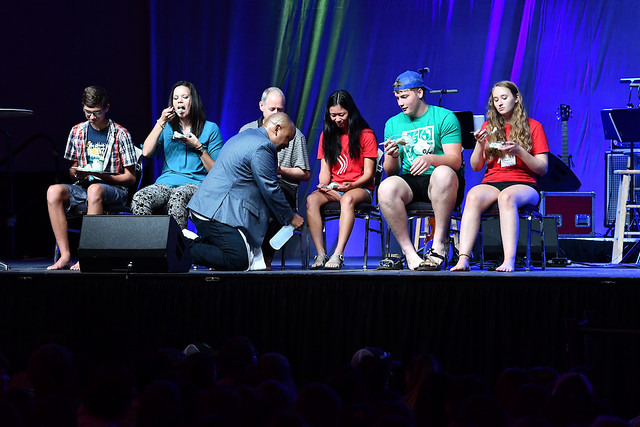
Mennonite Church USA announced on January 27 that the biennial Delegate Assembly, which normally happens over several days, will be scaled back to one virtual session due to uncertainty over COVID-19.
Delegates will meet online from 1 to 3:30 p.m. EDT on July 10, 2021, after the regular events of MennoCon21, scheduled for July 6-10 in Cincinnati, OH.
A long-awaited decision on whether to retire the Mennonite Church USA Membership Guidelines is being postponed because delegates will not meet in person this summer.
The hybrid convention, with worship, fellowship and educational activities, will have both onsite and virtual options.






 This year thousands of Mennonites from across the United States gathered in Orlando, Florida for the biennial Mennonite Church USA (MCUSA) Convention. The purpose of convention is to empower the church to achieve its vision, purpose and mission. Over the four days, members of congregations from across the country attend daily worship, workshops/seminars, participate in servant projects and delegates from MCUSA Congregations and Conferences attend business sessions. This year there was also the Future Church Summit, “a generative, open space for denomination-wide conversation — to dream together, reset priorities and engage one another in answering the question: How will we follow Jesus as Anabaptists in the 21st century?”
This year thousands of Mennonites from across the United States gathered in Orlando, Florida for the biennial Mennonite Church USA (MCUSA) Convention. The purpose of convention is to empower the church to achieve its vision, purpose and mission. Over the four days, members of congregations from across the country attend daily worship, workshops/seminars, participate in servant projects and delegates from MCUSA Congregations and Conferences attend business sessions. This year there was also the Future Church Summit, “a generative, open space for denomination-wide conversation — to dream together, reset priorities and engage one another in answering the question: How will we follow Jesus as Anabaptists in the 21st century?”
 The Future Church Summit was a new addition this year to Convention. It was a time of dreaming and visioning, and discerning how God is leading us to follow Jesus. Delegates were joined by others from throughout MCUSA including high school students who had been chosen to be part of the Summit. The first day was spent getting to know one another by answering questions such as “When did you feel most connected to the Mennonite Church? What nourishes your spirit by being Anabaptist?” There was also a time of grounding participants in the history of Anabaptism and Mennonites, drawing learnings from our past.
The Future Church Summit was a new addition this year to Convention. It was a time of dreaming and visioning, and discerning how God is leading us to follow Jesus. Delegates were joined by others from throughout MCUSA including high school students who had been chosen to be part of the Summit. The first day was spent getting to know one another by answering questions such as “When did you feel most connected to the Mennonite Church? What nourishes your spirit by being Anabaptist?” There was also a time of grounding participants in the history of Anabaptism and Mennonites, drawing learnings from our past. So when I learned the theme for
So when I learned the theme for  Our love has been put to the test in very specific ways as we have walked with congregation members in life and death. I witnessed people expressing their love by sharing meals, sending cards, sitting in silence, in unceasing prayer and in many other acts of love. I know this happens on a daily basis, not only at PMC but in all the churches spread out over our conference.
Our love has been put to the test in very specific ways as we have walked with congregation members in life and death. I witnessed people expressing their love by sharing meals, sending cards, sitting in silence, in unceasing prayer and in many other acts of love. I know this happens on a daily basis, not only at PMC but in all the churches spread out over our conference. It’s not been an easy time in
It’s not been an easy time in